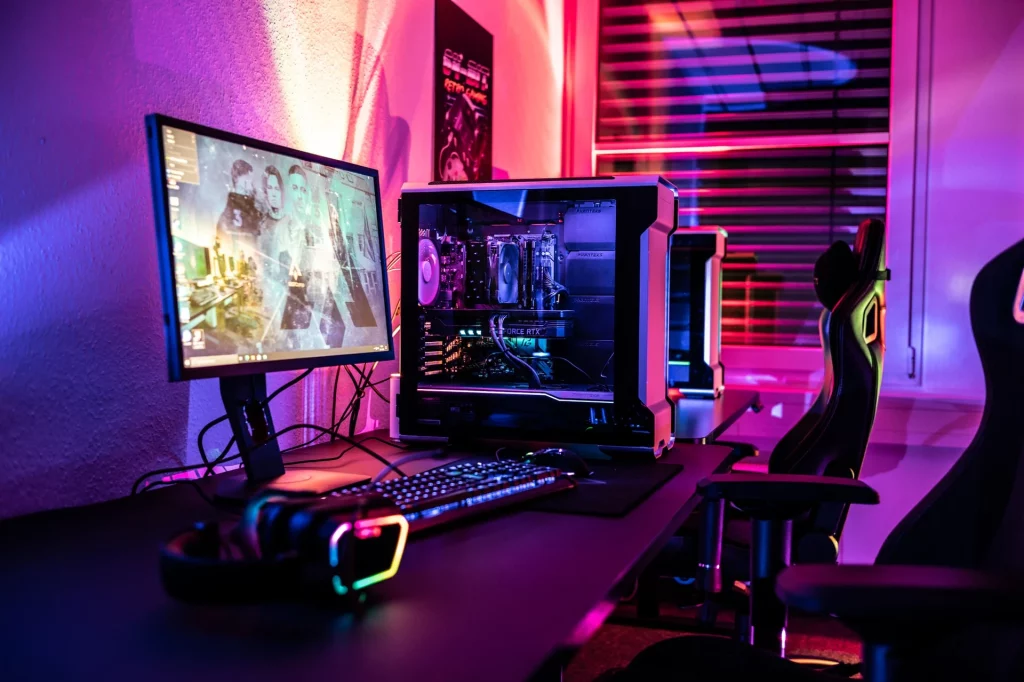When purchasing a gaming PC, whether pre-built or custom-made, there are several critical factors to consider to ensure you get the best performance, value, and longevity from your investment. Here are the 12 important things to consider while buying a gaming PC:
1. Budget
- Why It’s Important: The most crucial starting point. Your budget dictates the components you can afford and influences the overall performance of your gaming PC.
- Tip: Allocate more of your budget to the GPU and CPU for optimal gaming performance, and leave room for future upgrades.
2. Processor (CPU)
- Why It’s Important: The CPU is one of the core components affecting gaming and multitasking performance, especially in CPU-heavy games.
- Tip: For gaming, prioritize Intel Core i5/i7/i9 or AMD Ryzen 5/7/9. For gaming on a budget, a 6-core processor is adequate, but for high-end gaming and multitasking, aim for 8 or more cores.
3. Graphics Card (GPU)
- Why It’s Important: The GPU has the biggest impact on gaming performance, especially in high-resolution gaming or VR.
- Tip: Base your choice on your preferred gaming resolution:
- 1080p: NVIDIA RTX 3060 or AMD RX 6600.
- 1440p: NVIDIA RTX 3070 or AMD RX 6700 XT.
- 4K: NVIDIA RTX 3080/4080 or AMD RX 6800 XT/7900 XTX.
4. RAM (Memory)
- Why It’s Important: RAM determines how efficiently your system handles multiple tasks and games. Too little RAM can bottleneck even a powerful CPU/GPU combo.
- Tip: Go for at least 16GB DDR4 (3200 MHz or faster). 32GB is ideal if you’re streaming, video editing, or multitasking.
5. Storage (SSD vs HDD)
- Why It’s Important: Faster storage reduces game loading times and improves overall system responsiveness.
- Tip:
- Use a NVMe SSD (500GB to 1TB) for faster load times and system responsiveness.
- Add a secondary HDD (1TB or more) for storing games, files, and media if needed.
6. Cooling System (Air or Liquid)
- Why It’s Important: A good cooling system ensures your components run optimally and don’t overheat, which can prolong their lifespan and maintain performance.
- Tip:
- Air Cooling is cheaper and easier to maintain.
- Liquid Cooling offers better heat dissipation, especially for high-end systems or overclocking, but is more expensive and complex to install.
7. Power Supply Unit (PSU)
- Why It’s Important: The PSU powers all your components. If it’s not reliable or powerful enough, your system may not perform well or could be damaged.
- Tip: Use an 80+ Bronze or Gold rated PSU and ensure it has sufficient wattage (650W or more for most builds). Make sure there is headroom for future upgrades.
8. Monitor Compatibility
- Why It’s Important: Your monitor needs to match your gaming PC’s performance for an optimal experience. A high-performance GPU paired with a low-refresh-rate monitor will limit your visuals.
- Tip: For smooth gaming:
- 1080p/144Hz for competitive FPS gaming.
- 1440p/144Hz for a balance between performance and resolution.
- 4K/60Hz or higher for single-player games.
- Also, consider G-Sync or FreeSync compatibility for tear-free gaming.
9. Motherboard
- Why It’s Important: The motherboard connects all your components and determines expandability for future upgrades.
- Tip: Ensure the motherboard is compatible with your CPU socket and RAM (e.g., DDR4 or DDR5). If you plan to overclock, choose a motherboard that supports it (like a Z-series for Intel or X/B-series for AMD).
10. Upgradability
- Why It’s Important: Technology evolves quickly, so having room for upgrades ensures your gaming PC won’t become obsolete as fast.
- Tip: Choose a case with enough space for additional storage drives, a bigger GPU, and a more powerful PSU. Look for motherboards with extra PCIe slots, M.2 slots, and RAM slots.
11. Peripherals and Accessories
- Why It’s Important: Your gaming experience is not just about what’s inside the PC. Good peripherals (monitor, keyboard, mouse, headset) can enhance gameplay.
- Tip: Budget for:
- A high-refresh-rate monitor (144Hz or more for fast-paced games).
- A mechanical keyboard for precision.
- A gaming mouse with adjustable DPI.
- A high-quality gaming headset with surround sound for better gameplay.
12. Build vs Pre-Built
- Why It’s Important: Deciding between building a custom PC or buying a pre-built one impacts cost, customization, and future upgradability.
- Tip:
- Custom-built: More flexible, often cheaper, and allows you to select each component based on your preferences.
- Pre-built: Convenient but can be more expensive. Ensure you buy from reputable brands with good warranties.
Bonus Considerations
- Operating System (OS): Most gamers go with Windows 10/11 for compatibility with the widest range of games.
- Gaming Performance & Benchmarks: Check reviews and benchmarks for how your selected parts perform in the games you want to play.
- Warranties & Customer Support: Ensure your components come with a warranty, especially for pre-built systems. It’s crucial for peace of mind in case something goes wrong.
Final Thoughts
By considering these factors, you’ll make a well-informed decision that aligns with your gaming needs and budget, whether you’re aiming for competitive FPS games or a 4K experience.

